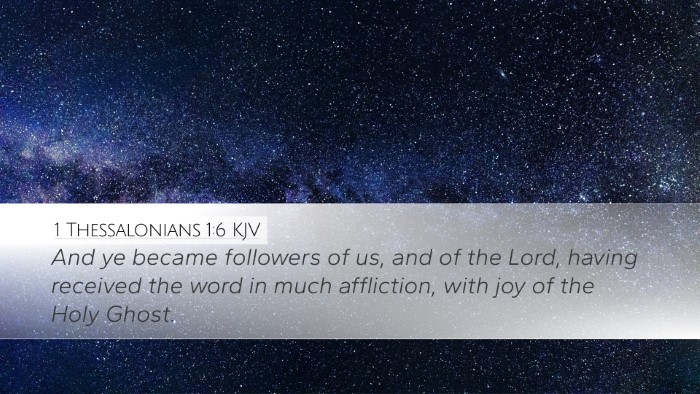In last Sunday’s message, SENDING OUT OUR FAITH (1 Thes. 1:6-10), we continued to look at the Apostle Paul’s commendation of the Thessalonian believers. Even though they were a young church (founded in less than four weeks on Paul’s second missionary journey- Acts 17:2), their love for Christ was evident to all as they sought to follow those who had led them to the Lord and Christ Himself (1 Thes. 1:6a; Eph. 5:1-7; 1 Cor. 11:1, etc.).
This reflected their willingness to suffer for Christ as receiving the “word [brought them] much [that is, severe] affliction” (1 Thes. 1:6) when they chose to forsake the idols of their culture (1 Thes. 1:9). But this could not dampen the true “joy of the Holy Spirit” they now possessed having become God’s children with their sins forgiven through the blood of Christ and Him permanently living in them (1 Thes. 1:6b; 2 Cor. 5:21; Eph. 1:13-14; 4:30b; John 14:16-18; Gal. 5:22-23; 2 Cor. 7:4-5, etc.).
The Thessalonian church had become “examples to all in Macedonia and Achaia” with God’s “word” sounding “forth” (1 Thes. 1:7-8a). The Greek word for “examples” (τύπος týpos) is singular in the original and refers not to a number of individual examples of Christian living, but rather to a single pattern of response to the Word that the church in Thessalonica had. It is derived from a root meaning to ‘strike’ or ‘hit.’ Their “faith… [that was lived out was] going out” to every place and impacting the entire Greek world (1 Thes. 1:8). It was marking or scarring unbelievers powerfully for Christ, so much so that Paul said his pioneer missionary role in that area was not even needed anymore! (1 Thes. 1:8).
They had been saved by grace through faith when they first trusted the Gospel (Eph. 2:8-9, etc.), and now this “faith [was going] out” because it was being lived out (i.e. it was a “labor of love” seen in their lives by all around them as they abided in Christ- 1 Thes. 1:3, 7-8; John 15:11, etc.). This evangelistic outreach was also motivated in part by what their faith looked forward to… “the patience of hope” that they had in the Lord’s imminent return (1 Thes. 1:3, 10; Heb. 6:10-12; 11:1). Hebrews 11:6 shows us “without faith it is impossible to please Him, for he who comes to God must believe that He is.” In other words, a person must trust the gospel (i.e. believe that God is who He says He is) to be saved/justified (John 1:12-13, etc.). Then God’s Word continues, “and that He is a rewarder of those who diligently seek Him” (Heb. 11:6b). After becoming God’s child, the Father wants our faith to be active and living for Him. He wants us to “diligently seek Him” by being filled with the Spirit (Eph. 5:18; Gal. 5:16-18, 25; 2 Cor. 5:7, etc.). The Thessalonian believers were doing this as they waited for Jesus to return “from heaven” and it pleased God (1 Thes. 1:8-10; Heb. 11:6b, etc.). They knew their living Savior, Jesus, who had risen from the dead and ascended to heaven would come for them and rescue them “from the wrath to come” (1 Thes. 1:10). We also have this “hope” that, as His children, we are never appointed to God’s wrath because Jesus took the wrath our sins deserved on the cross in our place when we were born into His family (John 3:7, 14-18; 2 Cor. 5:21; Mark 14:32-42 vs. Rev. 6:16; 14:10; 15:1, 7; 16:1, 16:19; Rev. 20:10-15, etc.)
Addendum: The Matthew and Mark account of “the blasphemy against the Holy Spirit” as an unforgivable sin occurred before the church was born (Matt. 16:18; Acts 2, etc.), and refers exclusively to Jewish leaders who (in that day) led the nation of Israel away from trusting in her long awaited and promised Messiah (i.e. Matt. 12:1-32; Mark 3:28-30). When the “multitudes [of the nation Israel] were amazed and said, ‘Could this [i.e. Jesus] be the Son of David?’” (Matthew 12:23), those Jewish leaders declared Christ worked His miracles, not by God’s power, but by “Beelzebub, the ruler of demons”- an “unclean spirit” (Matt. 12:24; Mark 3:30). In that way, they committed “The blasphemy against of the Holy Spirit” (Matt. 12:30-31; Mark 3:28-29) -a specific sin in their time- by rejecting the national offer by God to Israel to receive her King (the Son of David who will one day rule on David’s throne- 2 Sam. 7:12, 16; Ps. 89:34-35; Isa. 9:7; Matt. 1:1; Luke 1:31-32; Acts 1:6-7, etc.). The context of God’s Word here shows us it is not a sin that can reoccur or be committed by the church in our day. Of course, it is also true that all who reject the Gospel/Jesus today for any reason (to include the absurd notion that Jesus was demon possessed) will not be saved- because trusting Jesus’ sacrifice in their place is the only way a person can have his or her sins forgiven (i.e. John 8:24; 14:6; 1 Cor. 15:3-4; Rev. 20:15, etc.). While, sadly, we as Christians can be “faithless” at times in our lives (the Bible calls that “carnal”- 1 Cor. 3:1-15; 2 Tim. 2:11-13, etc.), the blood of Christ has (PAST TENSE) justified us from the penalty of sin (i.e. the lake of fire) forever (Rom. 3:24-26; 6:10; John 19:30, etc.). That is called grace (Eph. 2:5-9, etc.). May we respond to that grace as the Thessalonian church did in our study today with living, active faith that sounds forth like a trumpet or a clap of thunder to the lost and dying world around us! (1 Thes. 1:7-8; Heb. 11:6b; John 15:11; Rom. 12:1-2, 9, etc.).

